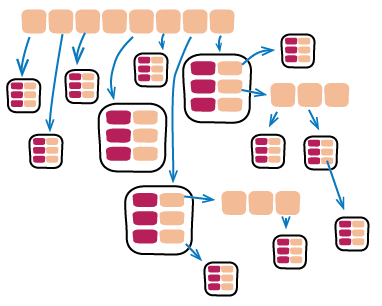tagged by: language feature
Collection Pipeline

Collection pipelines are a programming pattern where you organize some computation as a sequence of operations which compose by taking a collection as output of one operation and feeding it into the next. (Common operations are filter, map, and reduce.) This pattern is common in functional programming, and also in object-oriented languages which have lambdas. This article describes the pattern with several examples of how to form pipelines, both to introduce the pattern to those unfamiliar with it, and to help people understand the core concepts so they can more easily take ideas from one language to another.
Access Modifier
Object-oriented languages divide a program into modules called classes. Each class contains features, which consist of data (fields) and methods. (Not all languages use these terms, but they'll do for this.) Languages have various rules about what other classes can access the features of a class, these are often based on access modifiers that apply to a class.
Annotation
An annotation on a program element (commonly a class, method, or field) is a piece of meta-data added to that program element which can be used to embellish that element with extra code.
Call Super
Call Super is a minor smell (or anti-pattern if you like) that crops up from time to time in OO frameworks. Its symptoms are pretty easy to spot. You are inheriting from a super-class in order to plug into some framework. The documentation says something like “to do your own thing, just subclass the process method. However it's important to remember to start your method with a call to the super-class”. An example might be something like this.
Class Instance Variable
When you learn about objects, you usually learn that they can capture two kinds of data: instance and class. Instance variables are the most common case, the data varies with each instance of the object. Class variables, often referred to as static variables, are shared across all instances of a class. Every instance points to same value and any changes are seen by all. Class variables are much less common than instance variables, especially mutable class variables.
Dynamic Typing
I've long been loath to write any contributions on the debate between static and dynamic typing in programming languages. This is one of those emotive topics where people seem driven to debate rather than listen. But since I've been asked a few times about it, I will contribute my personal experiences. I'm not trying to convince anyone of anything, but I hope someone finds some food for thought in them.
Function As Object
In programming, the fundamental notion of an object is the bundling of data and behavior. This provides a common data context when writing a set of related functions. It also provides an interface to manipulating the data that allows the object to control access to that data, making it easy to support derived data and prevent invalid modifications of data. Many languages provide explicit syntax to define classes, which act as definitions for objects. But if you have a language with first-class functions and closures, you can use these constructs to create objects using the Function As Object pattern (originally described by Eugene Wallingford).
Javascript Promise
In Javascript, promises are objects which represent the pending result of an asynchronous operation. You can use these to schedule further activity after the asynchronous operation has completed by supplying a callback.
Lambda
As there is a growing interest in dynamic languages, more people are running into a programming concept called Lambdas (also called Closures, Anonymous Functions or Blocks). People from a C/C++/Java/C# language background don't have lambdas and as a result aren't sure what they are. Here's a brief explanation, those who have done a decent amount of programming in languages that have them won't find this interesting.
Language For Learning Objects
If I want to teach people object-orientation, which language should I use?
List And Hash

It's now common in many programming environments to represent data structures as a composite of lists and hashmaps. Most major languages now provide standard versions of these data structures, together with a rich range of operations, in particular Collection Pipelines, to manipulate them. These data structures are very flexible, allowing us to represent most forms of hierarchy in a manner that's easy to process and manipulate.
Protected Data
Is it good OO design to have data in my classes with the protected AccessModifier?
Public Csharp Fields
When I first came across C# I liked the notion of properties
right from the start. The getX and setX conventions of C++/Java always
seems rather silly to me, it's much more natural to write obj.X
= other.X. Providing a property with get and set methods turns
a common convention into a naturally supported feature of the
language.
Published Interface
Published Interface is a term I used (first in Refactoring) to refer to a class interface that's used outside the code base that it's defined in. As such it means more than public in Java and indeed even more than a non-internal public in C#. In my column for IEEE Software I argued that the distinction between published and public is actually more important than that between public and private.
Ruby Annotations
One of Ruby's most popular features is its support for metaprogramming, that is features that act like they change the language itself - introducing things like new keywords.
Smalltalk Books
From time to time I run into people who want to get a smalltalk and give it a spin to see what the fuss is about. My old favorite introductory smalltalk book went out of print, but I just discovered you can now download it from here together with lots of other smalltalk related material. The material is hosted by Stéphane Ducasse, who was a co-author on an excellent book on reengineering patterns.
Syntactic Noise
A common phrase that's bandied about when talking about DomainSpecificLanguages (or indeed any computer language) is that of noisy syntax. People may say that Ruby is less noisy than Java, or that external DSLs are less noisy than internal DSLs. By Syntactic Noise, what people mean is extraneous characters that aren't part of what we really need to say, but are there to satisfy the language definition. Noise characters are bad because they obscure the meaning of our program, forcing us to puzzle out what it's doing.
Transparent Compilation
Increasingly web developers are using languages like CoffeeScript and SCSS that compile to other textual source languages that execute in the browser. Such source-to-source compilers (also called transpilers ) are not new, Cfront was widely used in the early days of C++ to generate target C code. But for me there is a difference that picks out CoffeeScript and SCSS as transparent compilers
Uniform Access Principle

All services offered by a module should be available through a uniform notation, which does not betray whether they are implemented through storage or through computation.
-- Bertrand Meyer
Bertrand Meyer coined this principle in his highly-influential book Object-Oriented Software Construction.
The essential point of the principle is that if you have a person object and you ask it for its age, you should use the same notation whether the age is a stored field of the object or a computed value. It effectively means that a client of the person should neither know nor care whether the age is stored or computed.
goto Aarhus 2011

goto (formerly known as JAOO) has long been a favorite conference of mine. They've done a great job over the years of keeping a high standard of content combined with an efficient and friendly organization. So while my over-consumption of conferences has generally led to conference-phobia, I still feel a sense of pleasant anticipation when heading off for the somewhat complicated trip to Aarhus.
